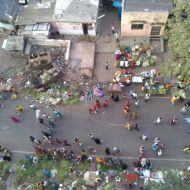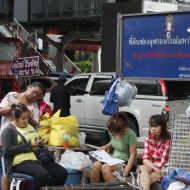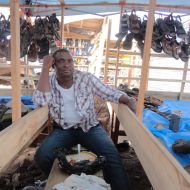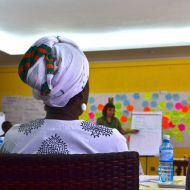Slum-Based Radio Stations Pioneer an Underserved Media Market
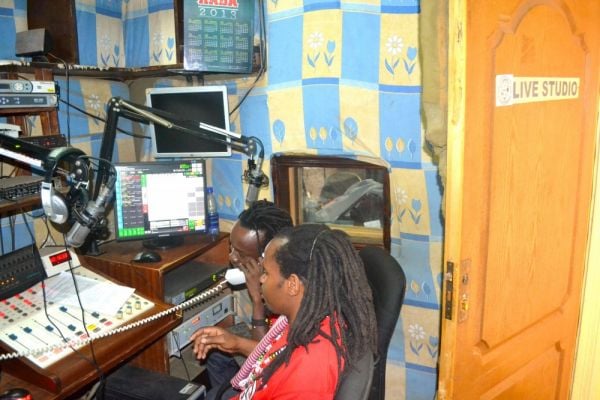
At Pamoja FM, Chris Olwehyi (a.k.a. MC Jahill) and Julius Kasyoka (a.k.a. Ras Juli) host “Pass the Mic, Speak your Mind!” a weekly reggae and community issues program. Photo credit: Sam Sturgis
As I climbed the steps of building “X9,” one of the tallest structures in the Ayany (eye-YAH-nee) neighborhood of Kibera, I began to hear a rumbling sound, growing louder with each floor I ascended. At the entrance to Pamoja FM (“unity” in Swahili) I found a small generator desperately trying to kick Kibera’s only radio station back to life – an inevitable contingency plan in a place where power failures are a regular occurrence.
Operating since 2007, this small studio has become Kibera’s version of NPR, broadcasting 24 hours a day and catering to a monthly listenership of over one million people. When violence broke out in the sprawling slum following the disputed 2007 elections, “Even mainstream media were covering the events through us,” proudly notes the station’s founder, Adam Hussein.
Few people have seen more of Kenya than Hussein. During decades of work as a photojournalist for Kenya’s most widely read newspaper The Daily Nation, he shot everything from the arid landscapes along the Somali border to the Great Rift Valley extending all the way up to the Arabian Peninsula. But after additional postings in neighboring Uganda, Tanzania and Zanzibar, “I decided to come home,” he says with a smile. “Kibera is my home and I found the people were lacking information.”
So he founded Pamoja FM (as his “retirement,” he laughs) and now Hussein, as the station’s managing director — along with his team of volunteer journalists, radio hosts and editors – represents the impressive media market that’s emerging in Nairobi’s informal settlements, home to more than half the city’s population.
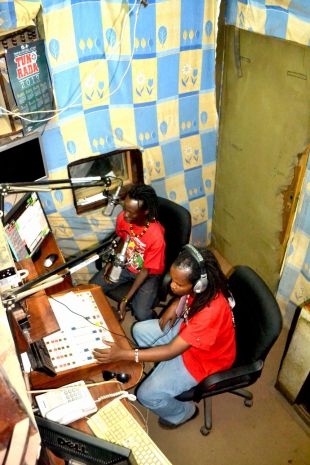
The studio at Kibera’s only radio station is small, but the influence of its broadcasts is felt far and wide. Photo credit: Sam Sturgis
“It [informal settlements] is a big, big market,” explains Felix Asoha, Pamoja FM’s deputy news editor. He points out that major media outlets often fail to present the news in a way that’s accessible to the residents of slums. For example, unlike national and citywide radio stations that may charge up to 40 shillings (46 cents USD) for a listener to call-in, Pamoja’s listeners pay only 1 shilling per call or SMS message. Whether they want to talk politics or request their favorite reggae song, “It remains affordable for the community,” says Asoha. “They are proud of their radio station. They know that if they send us a message it will be read.”
While slum-based radio stations are giving residents of Nairobi’s informal settlements a new voice, they’re also having a profound cultural effect on the city at large. Billed as “Your Official Sheng Station,” Ghetto Radio has emerged not only as the source of news and music for Eastlands – a neighborhood that’s home to informal settlements dating back to the colonial era – it has also become the city’s leading broadcaster of Sheng, a slang-based language that’s a combination of Swahili and English and originated among young slum dwellers in Nairobi during the 1970s.
“We were the first ones to dare broadcast in Sheng and accept the slang,” says Julius Owino, the managing director of Ghetto Radio, which has a monthly listenership of about 1.2 million and is Nairobi’s second most popular radio station during Tuesday and Friday afternoons, according to a 2012 survey. “Now even official cooperative advertisements and brand communication are in sheng.”
With only one week remaining until Kenya holds its presidential elections, radio stations like Pamoja FM and Ghetto Radio are aware that their responsibilities go beyond simply providing local news and music. In areas of significant marginalization and instability – the areas where these stations’ primary listenership resides – slum-based radio outlets may play crucial roles in preventing or managing election-related violence.
“The people who will carry machetes and stones or other weapons are the youth, who are our core listeners,” says Owino, a responsibility that prompted the station to run a five-hour “Vote 4 Kenya Vote 4 Peace” music program each Saturday morning.
Likewise, aspirants vying to be Kibera’s next MP, as well as Nairobi gubernatorial candidates, have been subjected to Meet the Press-style questioning by journalists on Pamoja FM. In a neighborhood where TV and Internet access continue to play second fiddle to the radio, these in-depth interviews are the likely best opportunity many Kibera residents will have to vet those seeking political office.
“Callers are always asking candidates on our shows, ‘What are you going to do if you lose?‘” says Hussein. “They don’t want to go back to the ’07-’08 violence,” a period that witnessed over 1,000 people be killed across the country.
When I left Pamoja’s studio, it was quieter than when I arrived. The generator had switched off, signaling that Nairobi’s largest slum had regained its voice. And just in time – with only seven days until the neighborhood heads back to the ballot box, residents are hoping that its broadcasts will help keep the pulse of Kibera steady.


